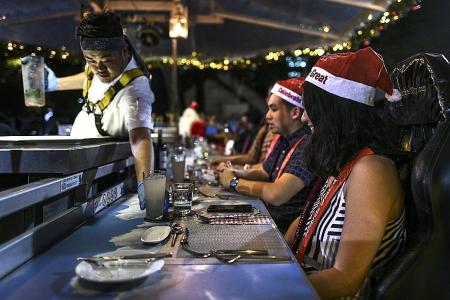Beware of holiday bingeing
Here are some do's and don'ts for eating and drinking during the holidays
Indulging is a given during the festive season.
But eating far more than the required calories for your height and weight can result in weight gain.
While weight gain may be attributed to a variety of reasons, an increase in calorie intake through more frequent social gatherings, larger portion sizes and higher intake of energy-dense food is common during this time of year.
Ms Alyssa Chan and Ms Tay Su Mei, dietitians at SingHealth Polyclinic, serve up the do's and don'ts of holiday bingeing.
Why is holiday bingeing not encouraged?
While there may be no immediate danger to health from a holiday binge, overindulging does have the tendency to throw one off course on his or her normal routine of a healthy balanced diet and physical activity.
It might also cause emotional distress to those who are conscious of their weight.
In addition, holiday weight gain is rarely lost, and may thus increase the risk of being overweight or obese.
It is most important that you go back to your regular habit of a healthy, balanced eating pattern.
This involves the inclusion of grains, fruits, vegetables, protein and adequate hydration. The maintaining of an active lifestyle should not be neglected as well.
What are the best tips to manage holiday feasting?
- Never visit hungry. Always make sure you have a light meal before the feast. This reduces the possibility of you over-indulging in your favourite caloric-dense party food. Skipping meals to save calories does not work and you often find yourself eating more. Reach for a high-fibre or protein-rich snack an hour or two before the big party. A fruit or a tub of low-fat yoghurt can be a convenient on-the-go snack.
- Watch your portion sizes. Using smaller plates and focus on bonding and having conversations with your friends and family members is an effective way to minimise overeating.
- Fill up with a healthy, balanced meal by including some grains, protein, fruits and vegetables to keep feeling satisfied. You may have desserts, but watchthe portions and quantity, as these are calorie-dense food which may not fill you up.
- Watch your drinks. It is easy to load up on your calories through sugar-sweetened beverages or alcoholic drinks. Opt for reduced or no sugar beverages such as water with cut lemons or mint, or diet soft drinks. If you choose to drink alcohol, it is encouraged to limit to one to two standard drinks per day.
- Never totally deprive yourself. It is alright to indulge but not over-indulge. Moderation is the key.
- Stay active. Hit the gym or go for a morning walk with your family and friends before the big party.
How does one detox after the holiday eating?
There is a growing popularity of dieting strategies purported to promote weight loss and elimination of toxins from our bodies. These may include juice cleanses, fasting or adhering to a restricted dietary pattern.
Many may turn to these dieting strategies for a quick fix to reduce their holiday weight gain.
However, detox diets may not be necessary as our bodies are naturally equipped with the ability to perform this.
The normal human body is designed to effectively remove unwanted waste products from our bodies, round the clock.
While detox diets may lead to rapid short-term weight loss, it is unclear if these are sustainable in maintaining a healthy weight in the long term.
Some suggest the avoidance of certain valuable food groups from your food intake, which may be dangerous and put you at risks of nutrient inadequacy, while others may also lead to harmful consequences, especially if you have underlying medical conditions, such as diabetes, kidney disease or heart disease.
Get The New Paper on your phone with the free TNP app. Download from the Apple App Store or Google Play Store now


